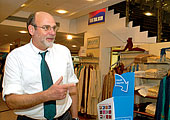12.00-2.00 P.M., APRIL 23, 2007
City Centre Mall, Gurgaon
 |
One moment I am at a small
table at Barista, waiting for my iced tea to arrive, and the next
I am being almost dragged along by a six-foot-four-inch former
judoka aficionado into a small store selling fancy salwar kameez
and sarees. "Tell me, what's wrong with this store?"
asks Paco Underhill, taking a corner near the store entrance.
Except that this is a Monday morning and there's just one female
customer in the store, I can't find anything wrong with the way
things look. Paco ("they used to call my dad Mr Underhill")
then takes a hard look at me, pauses for effect and continues:
"Who do you think are the primary customers at this store?"
It's a no-brainer. "Women," I tell him. "How many
women do you see behind the counter?" Actually, there are
none. "How would your wife feel if the male salesperson told
her that she looked good in a saree or salwar kameez that she
was trying out?" I get the point. "Take a look at this,"
Paco now races to the far end of the store, where there are two
trial rooms-rather, cubicles. "A trial room for women,"
he explains, "must have three different chambers: One, where
she can change clothes; two, where she can walk about a little
as she examines herself in the mirrors; and three, where her husband
or boyfriend can wait, but with equal privacy, so that she can
walk in wearing her new outfit for his approval."
It hasn't been 15 minutes since I caught up with the world's
best-known 'retail anthropologist' at India's best-known retail
destination, but he's already demolished whatever little pride
I had in India's organised retail. "A mall should be a place
where people can hang around in groups, shop in groups, and display
affection publicly," he says. "Unfortunately, the malls
in India seem to have taken traditional store formats and crammed
them inside four walls."
 |
| See the fault: It's not
three dimensional |
Paco, 54, should know. If retailing were a religion, he would
be its high priest. About 30 years ago, Paco gave up part-time
teaching (at City University of New York) and retail (he co-owned
Ear Inn, a bar in downtown Manhattan that still exists) to set
up Environmental Analysis and Planning Consultants, which later
got rechristened Envirosell, of which he is now President &
CEO. Truth be told, Paco, son of an American diplomat, did not
set out to become a retail anthropologist. He was helping out
at Project for Public Spaces back in the early 70s when he bumped
into William "Holly" Whyte, one of its co-founders and
a social scientist who spent his time studying how people interacted
with public spaces and then coming up with newer designs that
would make them even more people friendly.
Paco's tryst with destiny came in the form of an assignment
from New York's Lincoln Center, which wanted to find out if it
could expand a small store in the underground concourse without
affecting the pedestrian walkways. To do that, he had to observe
the pedestrians. One thing led to another and before Paco realised,
he was in the business of observing shoppers and helping retailers
understand consumer behaviour. By 1999, Paco (it's a Spanish nickname
derived from his real name, Francis) had authored his first seminal
book on the subject "Why We Buy: The Science of Shopping",
which has been translated into 18 different languages since, and
followed it up with "Call of the Mall" in 2004 on the
"geography of shopping".
Today, Paco is a familiar sight across stores around the world.
He travels more than 100 days a year, flying to 19 different countries
in five continents on assignments from clients such as Wal-Mart,
Gap and Starbucks. A relatively late entrant to India, Paco's
Envirosell has tied up with Delhi-based Technopak of Arvind Singhal
(who could well be India's very own Paco Underhill).
 |
| I could do with a jacket, but
where are the new arrivals? Paco at Lifestyle |
Meanwhile, Paco has moved on to a footwear store. He isn't happy
with what he sees. To begin with, there are no mirrors at ankle
height in the store; there's no sign that differentiates between
new arrivals and old stock, and he's really sore with the way
the lone check-out counter looks: a high chair, an old computer
and an even older calculator lying next to it. Our next stop is
the departmental store chain, Lifestyle, where, I am hoping, Paco
will find fewer flaws. I am wrong. Right at the entrance, there's
a big point-of-sale poster, but it is looking into the store,
with the result that the shoppers walking in only get to see the
poster's blank side. Unable to resist, Paco flips the stand-mounted
poster around only to be disappointed once more: The poster is
of Microsoft's XBox 360-one of Paco's clients. "I've been
telling these guys that such displays need to be three dimensional,"
he says in exasperation.
Further down the store, he finally sees something that pleases
him: a sign at the footwear department that says 'new arrival'.
But soon enough, he's back into his fault-finding mode: why aren't
the chairs and tables in the store coffee shop the ones that the
store sells? Why is the ad on the elevator doors that of a young
man when it is senior citizens who are most likely to use the
elevator? Why is there no attempt to make bed furnishing more
eye-catching? "That's not to say retailers in India aren't
doing a good job," says Paco. "It's just that there's
so much they can do better. But that's where we come in,"
he says with a grin, before wrapping up our two-hour mall audit
and dashing off for his next meeting.
Paco, ladies and gentlemen, will be back.
|







